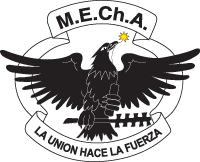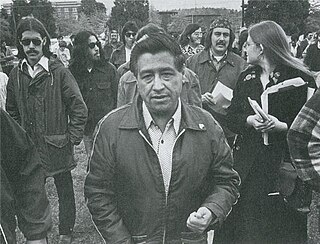A Mexican American (Spanish : mexicano-estadounidenses or mexicanoamericanos) is a resident of the United States who is of Mexican descent. [1] Mexican American-related topics include the following:
| Part of a series on |
| Chicanos and Mexican Americans |
|---|
 |
A Mexican American (Spanish : mexicano-estadounidenses or mexicanoamericanos) is a resident of the United States who is of Mexican descent. [1] Mexican American-related topics include the following:

Chicano or Chicana is an ethnic identity for Mexican Americans that emerged from the Chicano Movement. Chicano was originally a classist and racist slur used toward low-income Mexicans that was reclaimed in the 1940s among youth who belonged to the Pachuco and Pachuca subculture.

M.E.Ch.A. is a US-based organization that seeks to promote Chicano unity and empowerment through political action.

Pachucos are male members of a counterculture that emerged in El Paso, Texas, in the late 1930s. Pachucos are associated with zoot suit fashion, jump blues, jazz and swing music, a distinct dialect known as caló, and self-empowerment in rejecting assimilation into Anglo-American society. The pachuco counterculture flourished among Chicano boys and men in the 1940s as a symbol of rebellion, especially in Los Angeles. It spread to women who became known as pachucas and were perceived as unruly, masculine, and un-American.

Chicanismo emerged as the cultural consciousness behind the Chicano Movement. The central aspect of Chicanismo is the identification of Chicanos with their Indigenous American roots to create an affinity with the notion that they are native to the land rather than immigrants. Chicanismo brought a new sense of nationalism for Chicanos that extended the notion of family to all Chicano people. Barrios, or working-class neighborhoods, became the cultural hubs for the people. It created a symbolic connection to the ancestral ties of Mesoamerica and the Nahuatl language through the situating of Aztlán, the ancestral home of the Aztecs, in the southwestern United States. Chicanismo also rejected Americanization and assimilation as a form of cultural destruction of the Chicano people, fostering notions of Brown Pride. Xicanisma has been referred to as an extension of Chicanismo.
José Angel Gutiérrez, is an attorney and professor at the University of Texas at Arlington in the United States. He was a founding member of the Mexican American Youth Organization (MAYO) in San Antonio in 1967, and a founding member and past president of the Raza Unida Party, a Mexican-American third party movement that supported candidates for elective office in Texas, California, and other areas of the Southwestern and Midwestern United States.

The Chicano Movement, also referred to as El Movimiento, was a social and political movement in the United States that worked to embrace a Chicano/a identity and worldview that combated structural racism, encouraged cultural revitalization, and achieved community empowerment by rejecting assimilation. Chicanos also expressed solidarity and defined their culture through the development of Chicano art during El Movimiento, and stood firm in preserving their religion.

El Teatro Campesino is a Chicano theatre company in California. Performing in both English and Spanish, El Teatro Campesino was founded in 1965 as the cultural arm of the United Farm Workers and the Chicano Movement with the "full support of César Chávez." Originally based in Delano, California, during the Delano Strike, the theatre is currently based in San Juan Bautista, California.

Luis Miguel Valdez is an American playwright, screenwriter, film director and actor. Regarded as the father of Chicano film and playwriting, Valdez is best known for his play Zoot Suit, his movie La Bamba, and his creation of El Teatro Campesino. A pioneer in the Chicano Movement, Valdez broadened the scope of theatre and arts of the Chicano community.

The Centro Cultural de la Raza is a non-profit organization with the specific mission to create, preserve, promote and educate about Chicano, Mexicano, Native American and Latino art and culture. It is located in Balboa Park in San Diego, California. The cultural center supports and encourages the creative expression “of the indigenous cultures of the Americas.” It is currently a member of the American Alliance of Museums.

Chicana feminism is a sociopolitical movement, theory, and praxis that scrutinizes the historical, cultural, spiritual, educational, and economic intersections impacting Chicanas and the Chicana/o community in the United States. Chicana feminism empowers women to challenge institutionalized social norms and regards anyone a feminist who fights for the end of women's oppression in the community.

Chicano poetry is a subgenre of Chicano literature that stems from the cultural consciousness developed in the Chicano Movement. Chicano poetry has its roots in the reclamation of Chicana/o as an identity of empowerment rather than denigration. As a literary field, Chicano poetry emerged in the 1960s and formed its own independent literary current and voice.

Alicia Gaspar de Alba is an American scholar, cultural critic, novelist, and poet whose works include historical novels and scholarly studies on Chicana/o art, culture and sexuality.

The Chicano Art Movement represents groundbreaking movements by Mexican-American artists to establish a unique artistic identity in the United States. Much of the art and the artists creating Chicano Art were heavily influenced by Chicano Movement which began in the 1960s.
This is a Mexican American bibliography. This list consists of books, and journal articles, about Mexican Americans, Chicanos, and their history and culture. The list includes works of literature whose subject matter is significantly about Mexican Americans and the Chicano/a experience. This list does not include works by Mexican American writers which do not address the topic, such as science texts by Mexican American writers.
Hijas de Cuauhtémoc was a student Chicana feminist newspaper founded in 1971 by Anna Nieto-Gómez and Adelaida Castillo while both were students at California State University, Long Beach.
Gloria Arellanes was a political activist known for her involvement with the Brown Berets during the Chicano Movement and has been influential in the development of Chicana feminism. As the first female Prime Minister of the Brown Berets, Arellanes worked to include the Chicana perspective in fighting for Mexican rights in Los Angeles in the 1960s and 1970s. Conflicts of covert "macho attitude" within the delegation of labor in the Brown Berets led Gloria Arellanes along with other female Brown Berets to leave the organization and create Las Adelitas de Aztlán. Similar to the Brown Berets, Las Adelitas de Aztlán strived to assist its community members in creating awareness for better bilingual education in Los Angeles as well as protesting against the Vietnam War. Arellanes was also a prominent figure in the National Chicano Moratorium Committee, leading Las Adelitas de Aztlán to participate in marches against the violence of the Vietnam War.
The following is a timeline of Latino civil rights in the United States.

Mexican-American folklore refers to the tales and history of Chicano people who live in the United States.

The term Chicanafuturism was originated by scholar Catherine S. Ramírez which she introduced in Aztlán: A Journal of Chicano Studies in 2004. The term is a portmanteau of 'chicana' and 'futurism'. The word 'chicana' refers to a woman or girl of Mexican origin or descent. However, 'Chicana' itself serves as a chosen identity for many female Mexican Americans in the United States, to express self-determination and solidarity in a shared cultural, ethnic, and communal identity while openly rejecting assimilation. Ramírez created the concept of Chicanafuturism as a response to white androcentrism that she felt permeated science-fiction and American society. Chicanafuturism can be understood as part of a larger genre of Latino futurisms.
This is an alphabetical index of topics related to Hispanic and Latino Americans.